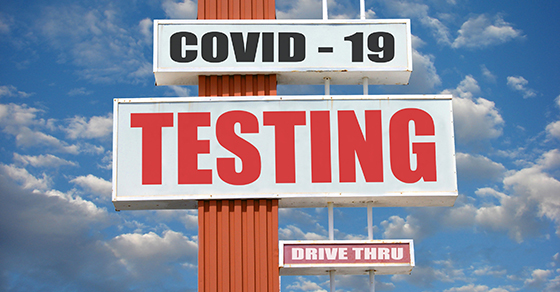Information Center
EMPLOYER TAX BRIEF
COVID-19 testing, diagnostics not minimum essential coverage

In Notice 2020-66, the IRS recently determined that Medicaid coverage limited to COVID-19 testing and diagnostic services isn’t minimum essential coverage under a government-sponsored program.
Thus, an individual’s eligibility for this coverage for one or more months doesn’t prevent those months from qualifying as coverage months for purposes of determining eligibility for the premium tax credit under Internal Revenue Code Section 36B.
Applicable large employers (ALEs) should take note. Under the Affordable Care Act (ACA), if an ALE doesn’t offer minimum essential coverage that’s affordable and provides minimum value to its full-time employees and their dependents, the employer may be subject to a penalty if at least one of its full-time employees receives a premium tax credit for buying individual coverage through a Health Insurance Marketplace (commonly referred to as an “exchange”).
Background
The Families First Coronavirus Response Act (FFCRA) authorizes states to provide COVID-19 testing and diagnostic services to uninsured individuals covered under Medicaid.
Under the ACA, eligible individuals who buy coverage under a qualified health plan through a Health Insurance Marketplace may claim a premium tax credit under Sec. 36B. Regulations provide that a taxpayer is allowed a premium tax credit only for months that are coverage months for individuals in the taxpayer’s family. Furthermore, a coverage month for an individual includes only those months that he or she is ineligible for minimum essential coverage other than coverage in the individual market.
Minimum essential coverage generally includes coverage under government-sponsored programs, including Medicaid. However, the IRS can — and has — determined that certain health care coverage providing limited benefits isn’t minimum essential coverage under a government-sponsored program. For example, tuberculosis-related services aren’t minimum essential coverage.
Interim and future guidance
In Notice 2020-66, the IRS announced its determination that, under the FFCRA, Medicaid coverage limited to COVID-19 testing and diagnostic services isn’t minimum essential coverage under a government-sponsored program. Thus, an individual’s eligibility for this coverage for one or more months doesn’t prevent those months from qualifying as coverage months for purposes of determining eligibility for the premium tax credit under Sec. 36B.
The IRS also announced that the agency intends to add Medicaid coverage of COVID-19 testing and diagnostic services to the list of health care coverage that isn’t minimum essential coverage under a government-sponsored program.
Applicable dates
Notice 2020-66 applies to tax years beginning in or after 2020. Until further guidance is issued, taxpayers may rely on the interim guidance described in the Notice.
Further, if no proposed regs or other guidance is released within 18 months after September 28, 2020 (the date the Notice is scheduled to be published in the Internal Revenue Bulletin), taxpayers may continue to rely on the interim guidance described. Until additional guidance is issued, the IRS won’t assert a position adverse to any taxpayer — including an ALE — based in whole or in part on the Notice. Please contact us for assistance in understanding whether and how the guidance may apply to your organization.